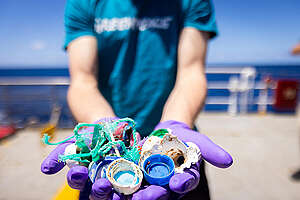So the political Oscars that was the 2020 summit has come to an end. The issue I had my eye on over the weekend was one close to our hearts here at Greenpeace – climate change. And funnily enough, every time I tuned into the radio over the weekend, all I kept hearing about climate change was that it is, indeed, Australia’s greatest challenge.
So top billing on the challenge list, hey? Given that, one would expect that it would be top billing for debates about “new, exciting, out of the box solutions”. Big problems need big solutions right? It’s just that I really didn’t hear much talk of big solutions at all.
But did they have the right people at the table to come up with the big solutions?
Overrun by the greenhouse mafia
A quick look over the list of delegates shows that the industry representatives were heavily dominated by a bunch of folk who have a vested interest in making sure fossil fuels keep on burning: BHP, Xstrata, Australian Coal Association, Babcock and Brown Power Company and Shell. AKA the Greenhouse Mafia. Who on earth let them in?
Contrast that with a mere two representatives from the renewable energy industry who, along with NGO representatives, must have had their work cut out putting forward a positive agenda.
How is it that our biggest challenge is decarbonising Australia’s economy, yet they forget to invite some of the leading lights from the renewables industry? I mean, surely these are the people who can put solutions on the table? And we know that it’s not because they weren’t nominated –it’s because they weren’t accepted.
Where did the green ideas go?
Wasn’t this the weekend for sharing big new ideas? Like how we can most quickly, fairly and smoothly become a nation powered by renewable energy and provide tens of thousands of green jobs along the way?
Make no mistake; the fossil fuel lobby did its job over the weekend. While it’s obvious to most of us and to the majority of the delegates at the Summit, that building new coal fired power stations is completely ludicrous given the carbon reductions needed in the next 12 years, the Greenhouse Mafia made sure they blocked consensus to include this in the report. It wasn’t even a particularly radical proposal that was put forward: that no new coal-fired power stations be built in Australia until carbon capture and sequestration is commercially available, proven, safe and efficient.
So the fossil fuel sector is OK with wilfully continuing to pollute? That’s certainly how it seems and why are we not surprised?
Yes sir, we have a political problem
Perhaps Tony Windsor, Independent MP for New England, who was “disappointed” with the climate change debate, especially around renewable energy, summed it up best when he said: “I think there’s this little bit of a political problem between clean coal and the renewables into the future and I think we probably could have gone a bit further on that”.
Beautifully understated Mr Windsor. There certainly is a “political problem”. One that is about vested interests and large profits, and an industry that doesn’t want to take responsibility for the global environmental damage it has helped create. One that is about maintaining the status quo so that those who reap the profits from polluting can continue to do so unabated.
Meanwhile many of the industries that want to be part of the solution don’t even get a seat at the table. Yes sir, we have a political problem.
Wakey, wakey
Well it’s time to wake up folks. The party’s over. We don’t want any more of your polluting coal-fired power stations. We want genuinely clean renewable energy – sun, wind, geothermal, however it comes. And we need a government that is prepared to engage with those who can deliver real long-term solutions.
In the meantime, our thanks go to those who did attend to the Summit to fight for the clean energy revolution and who sent a message to the PM that we need tough decisions on coal now. Job well done.
Helen Oakey, Head of Political Unit, Greenpeace Australia Pacific

